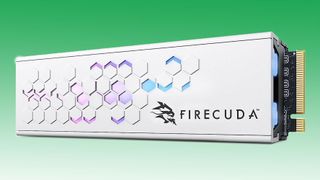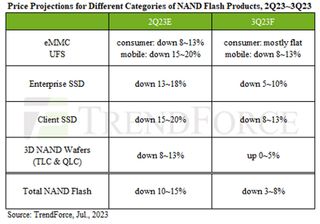SSD Upgraders Take Note, Analysts Expect up to 13% Price Drop During Q3
This is on top of the previous quarter's up to 20% decline.

TrendForce, the high-tech market intelligence firm, has published an update on the NAND flash market. Its latest forecasts see NAND flash's average selling price (ASP) falling between 3 and 8% in Q3 2023. However, for PC enthusiasts and DIYers, the news is even better. Client SSD pricing is expected to fall between 8% and 13% during the same period. In other words, those in the market for PC SSD storage could perhaps save an extra 10% or more on today's prices if they wait a few weeks.
NAND Flash chips are a major component in PC SSDs, products like smart devices (UFS and eMMC) and memory cards. The pricing of this essential storage device component will continue to fall significantly in the current quarter, according to the analysts at TrendForce.
As usual with its market intelligence reports, TrendForce provides some background and reasoning for its predictions. Currently, NAND makers are "making concerted efforts to scale back production," notes the analyst firm. Manufacturers thus hope to create artificial scarcity and pump up NAND pricing. However, TrendForce reckons that these efforts will be in vain and aren't enough to address the state of oversupply in Q3 2023 – even with the traditional seasonal demand surge expected in the coming months. TrendForce predicts pricing of NAND and NAND-based products to slide.

Looking closer at the segmented figures TrendForce provides, we see that Client SSD pricing looks likely to improve – for customers, not NAND producers. Last quarter was a great period for PC enthusiasts, DIYers and upgraders, with SSD ASPs sinking between 15% and 20%, according to the tabulated data. The continued drop of between 8 to 13% is also well worth waiting for if you are looking to do a new build or for an upgrade and you aren’t in a mad rush to complete it.
If you follow our news and deals, you will know there have been plenty of SSD bargains in recent weeks. We can be pretty confident that the deals are set to continue, probably improving, based on TrendForce data.
With NAND ASPs dropping, it isn’t only PC SSDs (AKA Client SSDs) that will be more keenly priced. TrendForce outlines how products like Enterprise SSDs, mobile storage (eMMC and UFS), and other devices have been impacted and are predicted to react. So, for Tom’s Hardware readers, the expected drops in smartphone and tablet components might be welcome to reduce upward price pressures on such products.
Last but not least, TrendForce doesn’t predict NAND ASPs will continue to drop steeply after Q3. It expects to see a rebound in high-end 3D NAND pricing first but doesn’t give any firm prediction on whether NAND ASPs will continue to fall or rise in Q4 2023.
Stay On the Cutting Edge: Get the Tom's Hardware Newsletter
Get Tom's Hardware's best news and in-depth reviews, straight to your inbox.

Mark Tyson is a Freelance News Writer at Tom's Hardware US. He enjoys covering the full breadth of PC tech; from business and semiconductor design to products approaching the edge of reason.
-
CelicaGT Every m.2 slot in every machine I own has had an NVMe drive installed in the last couple months. Doing my part to deplete inventory....Reply -
emike09 I'm just waiting for affordable 4 and 8TB drives from reputable manufacturers. I have four NVMe drives - two on the motherboard and two in a PCI-e module. I can't fit any more 2TB drives in my system, but have need for more NVMe storage.Reply -
Lafong I've been observing the falling prices of 4 TB SSDs of all types. They've been cut nearly in half in the last 12 to 18 months. Likely will commonly found at under 200 shortly.Reply
HOWEVER......I am having trouble convincing myself that SSDs are the best choice for long-term archival storage, where 95% of files are written once and rarely if ever read. Where speed is of minimum consequence after the original write. Never mind the price. So, I"m still considering HDDs.
I did bite on a new 500 GB NVMe boot drive for $35 a few months ago. I now see some under $30 at that size. -
TechieTwo Creating "artificial scarcity" is a two way street where at the end of the day a supplier might wish that they were more scrupulous.Reply -
bit_user Reply
They don't get much more reputable than Solidigm (the company formed by merging SK Hynix and Intel's NAND division). Their D7-P5520 is engineered for maximum reliability and incredibly consistent latency.emike09 said:I'm just waiting for affordable 4 and 8TB drives from reputable manufacturers. I have four NVMe drives - two on the motherboard and two in a PCI-e module. I can't fit any more 2TB drives in my system, but have need for more NVMe storage.
https://www.storagereview.com/news/under-the-hood-solidigms-latest-enterprise-ssds
Here's the best price I've found on their 4 TB and 8 TB models:
https://www.provantage.com/solidigm-ssdpf2kx038t1n1~7SLDG02U.htmhttps://www.provantage.com/solidigm-ssdpf2kx076t1n1~7SLDG02W.htm
I'm about to buy the 4 TB. If you have $1200 to spare, they even make a 16 TB drive.
If all of those are too rich for your wallet, another option is to buy used datacenter SSDs on ebay. -
emike09 Reply
I had a bad experience with Solidigm trying to RMA an Intel 660p after the merger. Instead of shipping me a replacement product, they insisted on using Western Union to send me a refund. Weirdest interaction I've had in an RMA. The reps I spoke to each time was from India, and I didn't feel comfortable with the Western Union transaction so I wrote it off and bought a Samsung drive instead. Everything about it seemed sketch.bit_user said:They don't get much more reputable than Solidigm (the company formed by merging SK Hynix and Intel's NAND division). Their D7-P5520 is engineered for maximum reliability and incredibly consistent latency.
https://www.storagereview.com/news/under-the-hood-solidigms-latest-enterprise-ssds
Here's the best price I've found on their 4 TB and 8 TB models:
https://www.provantage.com/solidigm-ssdpf2kx038t1n1~7SLDG02U.htmhttps://www.provantage.com/solidigm-ssdpf2kx076t1n1~7SLDG02W.htm
I'm about to buy the 4 TB. If you have $1200 to spare, they even make a 16 TB drive.
If all of those are too rich for your wallet, another option is to buy used datacenter SSDs on ebay.
After I stopped communicating with them (official support@solidigm.com address), I received about 20 additional e-mails asking why I stopped communication with them and to send them my financial info for Western Union. Everything screamed scam, but the communications seemed to be from official channels. Rant over.
Those drives listed are U.2 drives, but I could replace my existing PCI-e to NVMe adapter with a PCI-e to U.2 adapter. U.2/U.3 is superior anyways. I wish consumer/enthusiast motherboards came with them natively. -
bit_user Reply
That's indeed quite weird.emike09 said:I had a bad experience with Solidigm trying to RMA an Intel 660p after the merger. Instead of shipping me a replacement product, they insisted on using Western Union to send me a refund. Weirdest interaction I've had in an RMA. The reps I spoke to each time was from India, and I didn't feel comfortable with the Western Union transaction so I wrote it off and bought a Samsung drive instead. Everything about it seemed sketch.
After I stopped communicating with them (official support@solidigm.com address), I received about 20 additional e-mails asking why I stopped communication with them and to send them my financial info for Western Union. Everything screamed scam, but the communications seemed to be from official channels. Rant over.
With hard drives, you typically get a refurb drive as a warranty replacement. The logic of that seems to be that you drive was used before it failed, so why should they replace it with a new one? The only time it's really a bad deal is when the drive fails in the first couple months of use, which is why you often see the advice to return failed drives through Amazon or Newegg if you can. Anyway, I wonder if they didn't have enough refurb units to serve as replacements.
I have bought several of Intel's upper-tier SATA SSDs and a PCIe card (the datacenter version of the legendary 750), but never any of the M.2 NVMe generation. So far, never had a failure.
My hope and expectation is that their datacenter products are indeed a cut above their consumer gear, as reviews like this suggest:
https://www.storagereview.com/review/solidigm-p5520-maintains-lead-in-enterprise-workloads
Most Popular




